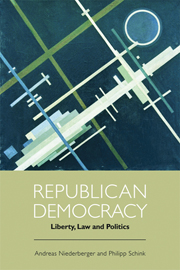Book contents
- Frontmatter
- Contents
- List of contributors
- Introduction
- 1 The Tension between Law and Politics in the Modern Republican Tradition
- 2 Impotence, Perspicuity and the Rule of Law: James Madison's Critique of Republican Legislation
- 3 Kant, Madison and the Problem of Transnational Order: Popular Sovereignty in Multilevel Systems
- 4 Republicanism and Democracy
- 5 Two Views of the City: Republicanism and Law
- 6 A Kantian Republican Conception of Justice as Nondomination
- 7 Two Republican Traditions
- 8 Freedom, Control and the State
- 9 Legal Modes and Democratic Citizens in Republican Theory
- 10 Rights, Republicanism and Democracy
- 11 Republicanism and Global Justice: A Sketch
- 12 Republicanism and Transnational Democracy
- Index
2 - Impotence, Perspicuity and the Rule of Law: James Madison's Critique of Republican Legislation
Published online by Cambridge University Press: 05 October 2013
- Frontmatter
- Contents
- List of contributors
- Introduction
- 1 The Tension between Law and Politics in the Modern Republican Tradition
- 2 Impotence, Perspicuity and the Rule of Law: James Madison's Critique of Republican Legislation
- 3 Kant, Madison and the Problem of Transnational Order: Popular Sovereignty in Multilevel Systems
- 4 Republicanism and Democracy
- 5 Two Views of the City: Republicanism and Law
- 6 A Kantian Republican Conception of Justice as Nondomination
- 7 Two Republican Traditions
- 8 Freedom, Control and the State
- 9 Legal Modes and Democratic Citizens in Republican Theory
- 10 Rights, Republicanism and Democracy
- 11 Republicanism and Global Justice: A Sketch
- 12 Republicanism and Transnational Democracy
- Index
Summary
Early in the spring of 1787, James Madison drafted a memorandum that holds a high place in the annals of American constitutional thinking. He called it, “Vices of the Political System of the U. States” (knowing scholars simply call it “the Vices”). Serious students of American political thinking recognize this manuscript as a first draft of that more celebrated text, Federalist 10, and find in its closing eleventh item, labeled “Injustice of the Laws of States,” the essential outlines of Madison's analysis of the sources of faction and the proper remedies for “the inconveniences of popular States.” The argument about republican injustice culminates a set of points that Madison initiated with two prior “vices” criticizing the “multiplicity” and the “mutability of the laws of the States.” Madison opened these concluding passages of the document with a remarkably understated transition. “In developing the evils which viciate the political system of the U. S.,” he began item nine, “it is proper to include those which are found within the states individually, as well as those which directly affect the States collectively, since the former class have an indirect effect on the general malady and must not be overlooked in forming a compleat remedy” (Madison 1999, 74). In fact, Madison held a much stronger opinion about the significance of this problem than his language suggests.
- Type
- Chapter
- Information
- Republican DemocracyLiberty, Law and Politics, pp. 41 - 61Publisher: Edinburgh University PressPrint publication year: 2013



